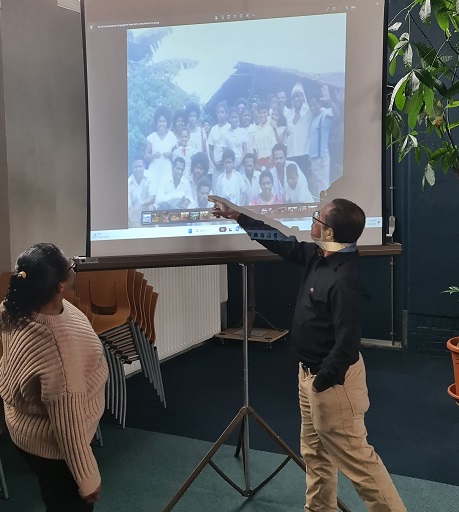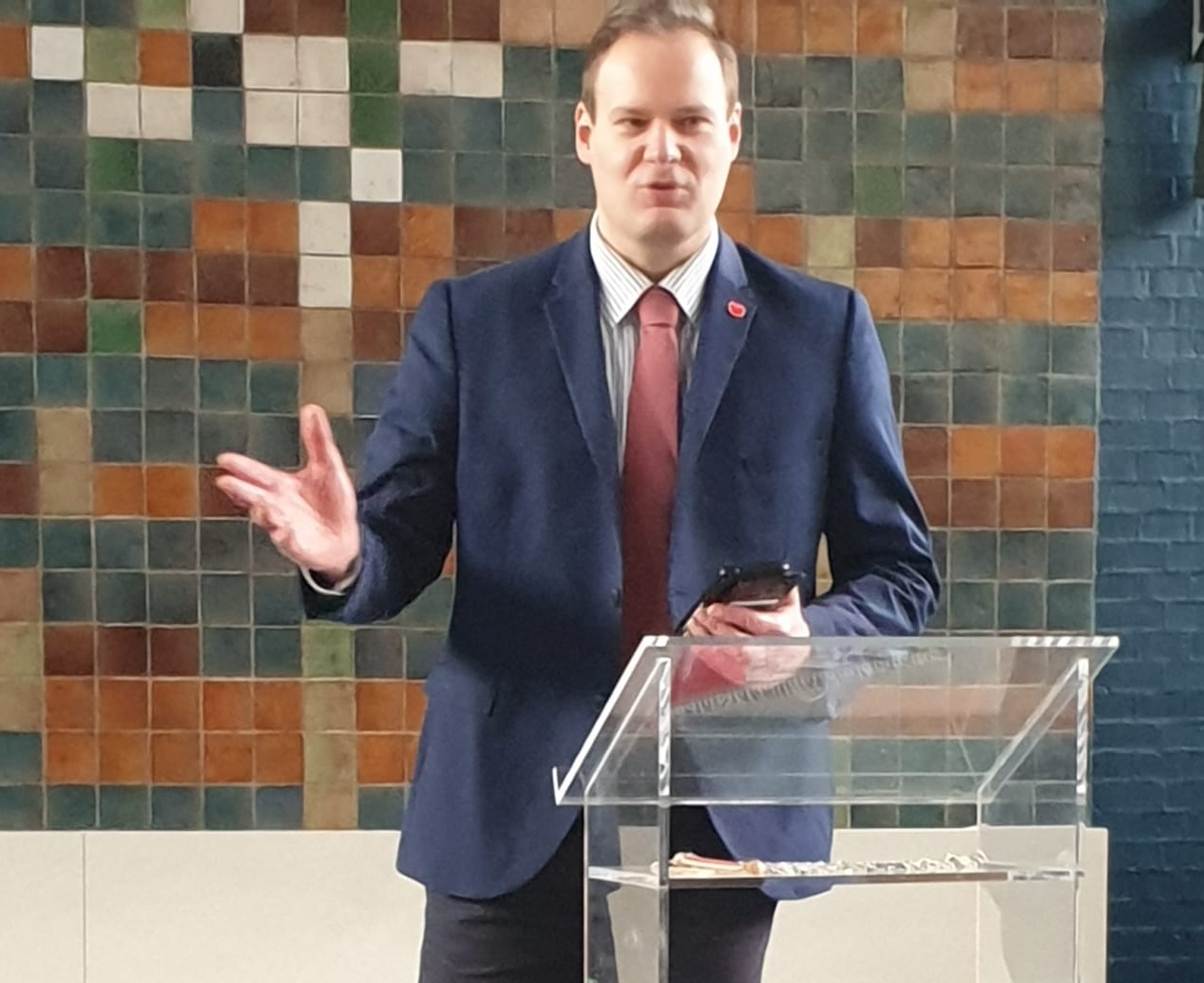On 10 February 2024, a conference highlighting the West Papua Refugee experience took place in The Hague. The text below is the English translation of my speech:
Good day,
I am happy to be present at this important meeting. After all, it occupies a central place in the story of West Papua. The journey of the Papuan refugees is characterized by enormous challenges and setbacks, but is also defined by their remarkable resilience and unwavering hope.
I am hopeful and optimistic about the road ahead.
The story of West Papua’s struggle is deeply intertwined with the historical context of Indonesian control of the region since 1962. In 1984, violent clashes between native Papuans and the Indonesian military caused a mass exodus, forcing many Papuans from their homes to escape in search of safety. The refugee camps in Papua New Guinea became a refuge for the refugees.
In the following years and decades, the fate of these refugees unfolded in different ways. Some returned to West Papua hoping for a peaceful existence, while others remained in the camps and endured the challenges of displacement. Others had to build new lives in far-flung lands across Australia and Europe, with each individual witnessing a personal journey marked by resilience and hope.
UNPO and 2014
I vividly remember the commemoration ten years ago in 2014, which shed light on the enduring historical journey of the refugees who fled West Papua four decades earlier and sought refuge across the border in Papua New Guinea. At the time, I was working at UNPO, a membership organization of underrepresented nations, peoples and states, committed to promoting their self-determination, human rights and democratic governance. For West Papuans, UNPO’s ethos resonated deeply with their aspirations for historical justice.
In November 2013, West Papua became a member of the UNPO. Simon, the West Papua representative, used this platform during our time in South Africa when they were accepted as new members. During meetings with key politicians, Simon seized the opportunity to rally international support for the Papuan cause, strengthening their fight against the injustices of history. This marked the beginning of increased cooperation with other marginalized and oppressed countries and peoples.
Looking back on the commemoration in February 2014 evokes a feeling of action for me, because we were busy with several important activities at the same time. We were preparing for a crucial meeting at the United Nations in Geneva, where representatives of Acheh, South Moluccas and West Papua would meet to address Indonesia’s human rights record and call for historic justice. This event took place in March 2014. At the same time, it was a period to commemorate the flight of the refugees who were driven from their homes in 1984.
I vividly remember my participation as one of the speakers at this memorial event. It was not held indoors in a hall as it is now, but was held in the open air at Beeklaan. The cold served as a reminder of the harsh reality faced by the refugees, whose journey began in the warmth of their homeland, but led them to unknown, sometimes cold and indifferent, but also open-hearted countries, such as the Netherlands. During that meeting I stood behind a rostrum and while I spoke into the microphone, I saw in the background passers-by who were on their way to the nearby tram stop and looked at me strangely because it is of course not an everyday occurrence; a conference near a tram stop.
The journey of the refugees from West Papua is also about the universal human experience of seeking refuge, of new beginnings in foreign lands, and of grappling with the deep sense of displacement that comes with such flight. As we commemorate their resilience and courage, we are reminded of the need to continue to advocate for their rights and strive for a future where all peoples, regardless of origin, can belong and find dignity.
Ten years have passed since that poignant commemoration in 2014. Today marks four decades since the harrowing exodus of West Papuan refugees. As we reflect on the intervening years, we cannot help but wonder about the fate of those who embarked on that tumultuous journey in 1984. Their paths, both physical and mental, diverged in countless ways, reflecting the complexity of displacement and the resilience of the human spirit.
For many who found refuge in the Netherlands, the experience marked the beginning of a profound transformation, as they built a new life in an unfamiliar environment. But even as they embraced the opportunities presented to them, the longing for their homeland remained. Papuan refugees grappled with the challenge of reconciling the new with the old, trying to weave together the threads of their past with the promise of a better future for all Papuans.
Amid this uncertainty, individuals emerged whose life purpose centered on bridging the gap between past and future, tirelessly advocating for historical justice and a renewed sense of identity for West Papua. Eleven years ago, I had the privilege of meeting such remarkable individuals, whose unwavering dedication to their cause served as a beacon of hope.
Under the inspiring leadership of Simon Sapioper, the current chairman and president of the NGRWP and the National Papua Association, the Papuan community has embarked on a journey to improve the well-being of Papuans both within the Netherlands and in Papua New Guinea and West-Papua itself. Through a wide range of initiatives and activities, they have sought to empower their community, preserve their cultural heritage and advocate for the rights and aspirations of all Papuans.
Central to their efforts is the promotion of cultural activities that serve both as a means of expression and a bridge to their ancestral roots. Through music and dance performances, the Papua Association allows people to participate in Papuan culture, enriching the collective story of our shared cultural landscape in the Netherlands.
In addition to their cultural efforts, the Papuan community, under the leadership of Simon Sapioper, has been at the forefront of advocacy on the international stage. Through their presence and involvement at United Nations conferences in Geneva, they have worked tirelessly to highlight the plight of West Papua, draw attention to human rights violations and initiate crucial dialogues aimed at promoting political reconciliation and progress.
I have had the privilege of participating in many of these efforts over the past decade. Yet I realize that there is still a lot of work to be done. However, as we look to the future, I remain hopeful that there are ample opportunities to further advance the cause of West Papua.
COMMISSION ON NATIONAL MEMORIAL DAY
I was told yesterday that the National Papua Association, which has existed since 1996, is rooted in an earlier organization. Apparently in 1994, a group of Papuans came together to form the National Day of Remembrance Committee. They were driven by a shared determination to honor the memory of the exodus of refugees from West Papua ten years earlier. They recognized the lasting impact of this crucial moment in collective history and organized a fitting tribute to commemorate the resilience of the Papuans.
UPCOMING EXHIBITION
I would like to end my speech with a look to the future. Countless opportunities await us. Among these opportunities is the project entitled ‘A Journey of Struggle and Hope’. The primary goal of this project is to provide a perspective on the Papuan refugee experience. We want to offer a glimpse into people’s lives through a photo exhibition and an accompanying photo book of these resilient individuals. The story not only attempts to document history, but also to promote understanding and empathy, bridge the gap between cultures and increase awareness of the situation of Papuan refugees.
The project will be officially launched on June 20, 2024. It coincides with International Refugee Day. After this opening event, the photo exhibition will embark on a global journey, visiting major cities such as The Hague, Rotterdam, Brussels, New York and Geneva. The project will end on June 20, 2025 with an exhibition at the Parliament of Papua New Guinea in Port Moresby, providing a symbolic return to the place where for many the refugee journey began.
I hope that the ‘A Journey of Struggle and Hope project’ will be more than just an exhibition, but can also become a catalyst for greater awareness, empathy and action. By witnessing the trials and triumphs of refugees over four decades, from 1984 to 2024, we honor their resilience and amplify their voices on the world stage.
I would now like to show some photographs that may be included in this exhibition.


